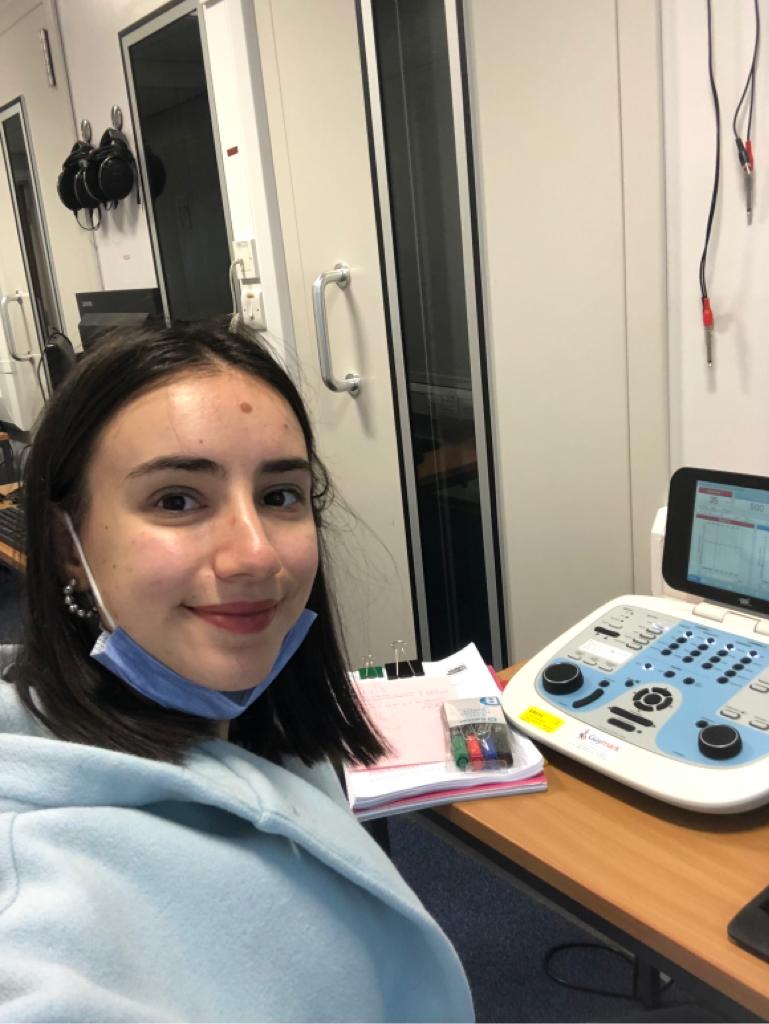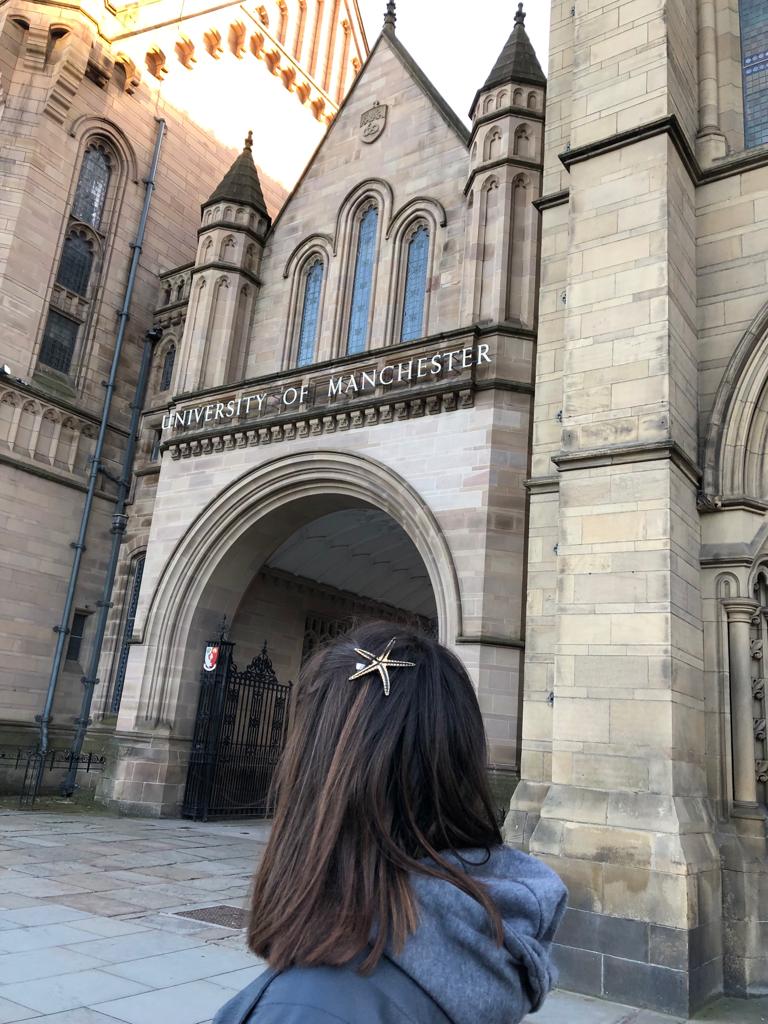Audiology Interview Series #3 Özgenur ÇETINBAĞ KUZU | The University of Manchester

Hi all, we have a special guest in this episode, Ozgenur CETINBAG KUZU, from the University of Manchester.
I hope you will love this interview!
Ozge, thank you for sharing your experiences and knowledge with us!!
Let’s start!
PS: If you have a question, please comment below. You will get an answer:)
- Can you introduce yourself?
Hello, I am Ozgenur Cetinbag Kuzu, currently a third-year PhD student in Audiology at the Manchester Centre for Audiology and Deafness (ManCAD), University of Manchester. I started my PhD in 2019. I am a scholarship student and I have the Turkish Ministry of National Education scholarship. Before starting my PhD, I achieved my bachelor’s degree in Audiology at Hacettepe University, Turkey in 2017. After that, I finished my master’s degree in Audiology at Dokuz Eylul University, Turkey in 2019. My Master’s thesis is named ‘Evaluating Auditory-Vestibular Findings In Patients With Noise-Induced Hearing Loss’. I have 2-year clinical experience throughout my master degree in general audiological (including patients with cochlear implant and hearing aids), vestibular measurements (AC VEMPs, VHIT, patients with BPPV) and vestibular rehabilitation.
- How did you meet with Audiology? Can you give us information about your bachelor’s degree?
At the time I made my choice, Audiology was a very new profession in Turkey and was not well known. First, my family recommended me to the audiology department. In fact, I did not look at this profession very eagerly because I had never heard of it till then. However, after researching the contents of the Audiology section, I decided that there was indeed a section that suited me perfectly. Throughout my bachelor’s degree in Audiology, I had taken high-quality lessons for every subpart of the Audiology by various Audiology experts and professors. I also had lots of experiences in clinical internships during my education.
- How did you start your PhD education abroad? What steps did you take until now?
Initially, my father had seen the YLSY scholarship programme, and he had suggested me. After that, I had decided that it is a great way to go on my academic career. Before I started my PhD education, I was continuing my master’s education in Izmir and at the same time; I was working in order to get an IELTS score by going to a language course in the evenings. I was very exhausted every day, but I have never thought of giving up.
- What did you pay attention to when choosing a university and research field for your PhD education?
I have decided on my interest area during my master’s degree in Audiology. I am keen on learning the vestibular system, and related other systems with it. I started to prepare a research proposal with this field at first. At the same time, I would like to work with a qualified supervisor in the United Kingdom. Actually, the most important thing is a qualified supervisor than university for me.
- What challenges did you face before starting the PhD education? How did you deal with that issues?
I had faced lots of problems before the beginning of my PhD. As I said before, I have to go on theoretical and clinical education for my master’s degree and at the same time had to study for the IELTS exam. In this period, I was writing also my master thesis. I knew ideas about my future, so I did not want to give up and I forced myself to move on. Thanks to the huge support of my family, my husband and my colleagues, I coped with all these problems and was successful!
- What kinds of pros and cons have been doing a PhD in the United Kingdom?
I think the best advantage of doing a PhD in the United Kingdom is the qualification of the education and opportunities for various types of audiology labs. Another advantage is to be gained experience when recruiting participants with native English-speaking for my research in labs. The one disadvantage could be being a completely independent researcher. It is really difficult sometimes because the supervisory team usually expect this. Also, academic writing in English is completely different and their expectations are high-standard, even if you are an international student!
- How is going your PhD education, and can you tell us information about the meetings?
I had designed some online questionnaires and tests for online experiments of my PhD study, and I am currently writing them for publication. Also, I started to write my thesis chapter 1. I am planning to start face-to-face data collection in the following months for the lab-based version of my PhD experiment. In the first year, we did our meetings weekly. After that, we started to schedule our meetings on an online platform every two weeks.
- Can you talk about your routine, social activities and relationships?
I usually work on the weekdays and sometimes on weekends. In my PhD, I have flexible working hours which is nice. Sometimes, I go to my office and sometimes I work from home. Due to the COVID-19 pandemic, unfortunately, my PhD was generally continued online and working from home. We sometimes organize online meetings with other PhD students and these events are really helpful for understanding the research environment. For socialising, I am really keen on exploring hidden places in Manchester City and so I usually go for long walks 3-4 days a week with my husband. I also try to discover all around the UK, especially London which is a great city to explore!
- What do you think about doing research?
I like doing academic research and reading articles for it. I keep myself up-to-date in this way. I think it is the fundamental part when doing a PhD.
- Can you talk about your research proposal? Do you satisfied with the subject you have been working?
My research proposal is based on sound level preferences between musicians and non-musicians and their relation to auditory and vestibular systems. I am pleased to work on this topic which comprises my all interests. It includes many unanswered questions, so it is nice to research them.
- What are the differences between Turkey and the United Kingdom in the clinical and academic?
In the UK, being a clinician and academic researcher are completely distinct from each other. I am studying as an academic researcher in Manchester, thereby I could not have much experience in clinics in the UK. However, in Turkey, PhD researchers study in both clinical and academic studies. I think conducting academic and clinic research generally is a bit exhausting at the same time.
- What are the qualifications to conduct a PhD research? How do you improve yourself?
The PhD is a very long and tiring process. You must have an eagerness to research. It is important to be open to innovations and follow up-to-date literature. I think the most important thing is to be an independent researcher. In the UK, doctoral student is expected to become independent researcher and be able to act completely independently about their own research.
- Do you have any recommendations for students who want to proceed with MSc or PhD?
I strongly recommended that they should ask themselves that whether they really want to do this. Since this is a really demanding and long process and it requires many skills such as the ability to conduct research independently, to love to do research, follow up latest knowledge in your specialised area and to be inquisitive. I also recommend them to improve themselves in other areas such as statistics, academic writing and presentation skills, because these are key elements throughout a PhD education.
See you in the following interview! We are waiting for your contributions and comments!











